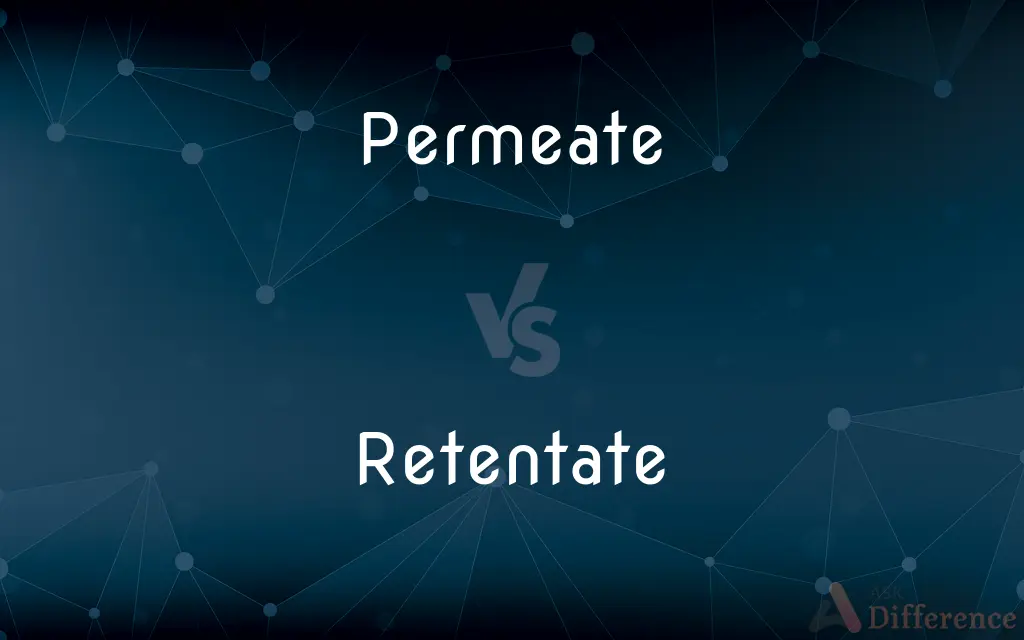Permeate vs. Retentate — What's the Difference?
Edited by Tayyaba Rehman — By Fiza Rafique — Updated on April 8, 2024
Permeate is what passes through a filtering medium, often seen in filtration processes, whereas retentate is what's retained or not passed through, highlighting opposite aspects of separation.

Difference Between Permeate and Retentate
Table of Contents
ADVERTISEMENT
Key Differences
Permeate refers to the portion of a fluid that passes through the filter in a filtration process, capturing substances small enough to pass through the filter's pores. This concept is pivotal in processes like reverse osmosis and microfiltration, where separating components based on size or molecular weight is crucial. On the other hand, retentate, also known as concentrate, is the fraction that does not pass through the filter, being either too large or unable to penetrate the filter medium. It represents the material held back, emphasizing the filtration process's selectivity.
In the context of water treatment, permeate is often the desired output, representing purified water that has been cleared of contaminants, pathogens, or unwanted chemicals. This contrasts with retentate, which contains the concentrated contaminants or substances removed from the original solution. While permeate quality is critical for the suitability of water for drinking or industrial use, retentate management is also essential to prevent environmental harm.
When discussing membrane filtration technologies, the efficiency and effectiveness of a system can be assessed by its ability to produce high-quality permeate while minimizing the volume of retentate. This is because a higher permeate flow rate indicates efficient separation and lower energy consumption, whereas excessive retentate can signal process inefficiencies or the need for frequent filter cleaning or replacement.
In the dairy industry, for example, ultrafiltration processes are used to separate milk components, resulting in permeate that contains water, lactose, and minerals, and retentate that is rich in proteins and fats. Here, both permeate and retentate have commercial value, but for different applications, highlighting the importance of optimizing the filtration process for desired outcomes.
Despite their opposing natures, both permeate and retentate are integral to understanding and optimizing filtration processes across various industries. Their management and utilization are key factors in environmental sustainability, process economics, and the quality of the final products.
ADVERTISEMENT
Comparison Chart
Definition
The fraction that passes through a filter
The fraction retained by a filter
Also Known As
Filtrate
Concentrate
Common in
Water treatment, dairy processing
Water treatment, dairy processing
Significance
Indicates purity and quality of filtered component
Indicates efficiency of separation and potential waste
Applications
Drinking water, ingredient in food products
Waste management, concentrated product processing
Compare with Definitions
Permeate
The part of a solution that passes through a membrane during filtration.
The permeate from the reverse osmosis process is used as drinking water.
Retentate
Material retained on the filter surface during filtration.
We analyzed the retentate to understand what contaminants were present.
Permeate
Liquid that has been purified by passing through a filter.
The permeate was clear and free of sediment.
Retentate
The residue or by-product of filtration.
Managing the retentate efficiently is crucial to reduce waste.
Permeate
Filtrate obtained through selective separation.
The permeate contained only the smallest molecules, as intended.
Retentate
The non-permeate fraction in membrane filtration.
The retentate stream was redirected for additional treatment.
Permeate
Substance that crosses a barrier in filtration.
The system's efficiency is measured by the volume of permeate produced.
Retentate
The concentrated substance left after filtration.
The process yielded a highly valuable retentate, used in further processing.
Permeate
The output of a filtration process that is considered pure.
In cheese making, permeate is often discarded or used for other purposes.
Retentate
The portion of a mixture that is not passed through the filter.
The retentate was rich in proteins, suitable for cheese production.
Permeate
To pass through the openings or interstices of
Liquid permeating a membrane.
Retentate
That which is retained, especially by a filter or porous membrane.
Permeate
To spread or flow throughout; pervade
"Our thinking is permeated by our historical myths" (Freeman J. Dyson).
Permeate
To spread through or penetrate something.
Permeate
(transitive) To pass through the pores or interstices of; to penetrate and pass through without causing rupture or displacement; applied especially to fluids which pass through substances of loose texture
Water permeates sand
Permeate
(transitive) To enter and spread through; to pervade.
Permeate
A watery by-product of milk production.
Permeate
Liquid that has passed through a filtration system.
Permeate
To pass through the pores or interstices of; to penetrate and pass through without causing rupture or displacement; - applied especially to fluids which pass through substances of loose texture; as, water permeates sand.
Permeate
To enter and spread through; to pervade.
God was conceived to be diffused throughout the whole world, to permeate and pervade all things.
Permeate
Spread or diffuse through;
An atmosphere of distrust has permeated this administration
Music penetrated the entire building
Permeate
Pass through;
Water permeates sand easily
Permeate
Penetrate mutually or be interlocked;
The territories of two married people interpenetrate a lot
Common Curiosities
What is permeate in filtration?
Permeate is the part of a fluid that passes through the filter, representing the filtered component in a filtration process.
What does retentate mean?
Retentate refers to the fraction of a mixture that does not pass through a filtration membrane, often containing concentrated substances.
Can retentate have value in industrial processes?
Yes, retentate can have commercial value, especially in industries like dairy, where it contains concentrated proteins and fats.
How do permeate and retentate differ in membrane filtration?
In membrane filtration, permeate is the filtered liquid that has passed through the membrane, while retentate is the concentrated remainder that does not pass through.
What is the significance of permeate in water treatment?
Permeate signifies the purified water obtained after filtration, crucial for ensuring water quality and safety for consumption or use.
Does the quality of the original mixture affect permeate and retentate?
Yes, the quality and composition of the original mixture directly influence the characteristics and value of both permeate and retentate.
Why is the management of retentate important?
Proper management of retentate is essential to minimize environmental impact and handle the concentrated waste efficiently.
How can the efficiency of permeate production be improved?
Efficiency can be improved by optimizing filter characteristics, process conditions, and regular maintenance to reduce clogging.
What determines the composition of permeate and retentate?
The composition is determined by the filter's selectivity, the size of its pores, and the characteristics of the substances being filtered.
What are the environmental considerations with retentate disposal?
Environmental considerations include preventing pollution, reducing waste, and exploring ways to reuse or recycle retentate.
What challenges are associated with retentate management?
Challenges include handling high concentrations of waste, potential for filter clogging, and the cost of disposal or further processing.
How does the quality of permeate affect the filtration process?
The quality of permeate affects the overall effectiveness of the filtration process, indicating the level of purification and system efficiency.
Is the process to increase permeate flow desirable?
Increasing permeate flow is desirable as it indicates efficient filtration, less energy consumption, and higher process throughput.
What role does retentate play in assessing filtration performance?
Assessing retentate helps understand the effectiveness of the filter in removing undesired components and optimizing the filtration process.
How do industries utilize permeate?
Industries utilize permeate as a product or by-product, depending on its purity and the presence of valuable constituents.
Share Your Discovery

Previous Comparison
Birds vs. Duck
Next Comparison
Gypsum vs. DrywallAuthor Spotlight
Written by
Fiza RafiqueFiza Rafique is a skilled content writer at AskDifference.com, where she meticulously refines and enhances written pieces. Drawing from her vast editorial expertise, Fiza ensures clarity, accuracy, and precision in every article. Passionate about language, she continually seeks to elevate the quality of content for readers worldwide.
Edited by
Tayyaba RehmanTayyaba Rehman is a distinguished writer, currently serving as a primary contributor to askdifference.com. As a researcher in semantics and etymology, Tayyaba's passion for the complexity of languages and their distinctions has found a perfect home on the platform. Tayyaba delves into the intricacies of language, distinguishing between commonly confused words and phrases, thereby providing clarity for readers worldwide.














































